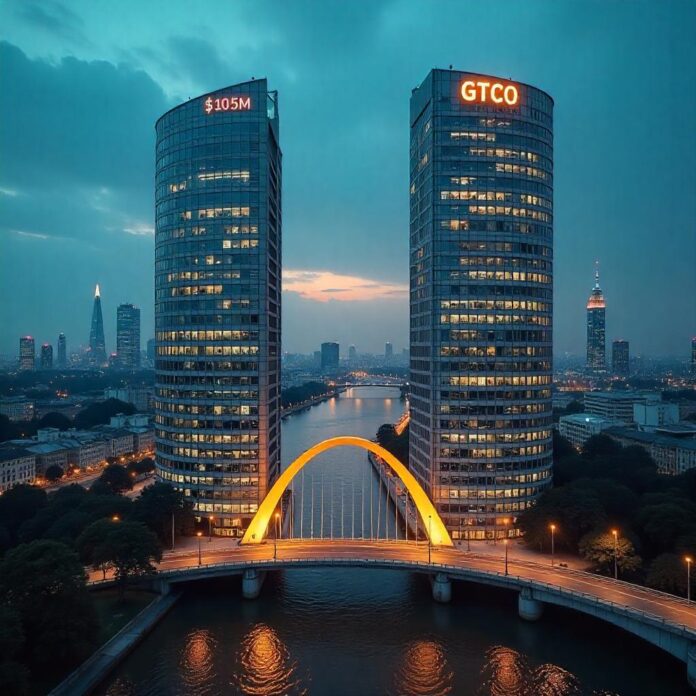The Landmark Offering: Breaking Down the Numbers
GTCO executed a financial masterstroke by raising $105 million through its London share offering, surpassing the initial $100 million target. This capital infusion originated from issuing 2.29 billion new ordinary shares priced at ₦70.00 per share ($0.0459). Post-transaction, GTCO’s total shares expanded to 36.43 billion, with 99.9% held by public investors. This elevated its market capitalization beyond ₦3 trillion ($2.4 billion), reinforcing its status as Nigeria’s most valuable banking institution.
The transaction’s architecture reveals meticulous planning. Shares commenced trading on the London Stock Exchange on July 9, 2025, under temporary ticker GTHC, transitioning to GTCO following Global Depositary Receipt cancellations. Simultaneously, shares retained the GTCO symbol on the Nigerian Exchange. The pricing strategy incorporated a deliberate 15% discount to GTCO’s ₦82.75 closing price on the Nigerian Exchange during the offer period, creating an attractive entry point for global institutional investors.
Critical offering metrics demonstrate strategic foresight. Gross proceeds of $105 million signal exceptional investor confidence in GTCO’s trajectory. The issuance of 2.29 billion shares represents a calculated 6.7% dilution that significantly fortifies the capital base. Post-offer share capital of 36.43 billion shares enhances cross-border trading liquidity. The London listing date of July 9, 2025, marks a historic operational milestone for African financial markets.
Why London? Strategic Drivers Behind the Move
This London listing constitutes a strategic response to three converging market forces. First, Nigeria’s banking recapitalization mandate requires international banks like GTCO’s subsidiary to maintain ₦500 billion ($327 million) in capital by March 2026. This $105 million raise, combined with 2024’s ₦209 billion ($134 million) domestic offering, directly addresses this regulatory imperative.
Second, transitioning from Global Depositary Receipts to ordinary shares dismantles barriers for international capital. Unlike thinly traded GDRs, ordinary shares on the LSE’s main market attract pension funds, asset managers, and ETFs seeking African exposure. This structural shift repositions GTCO within global investment portfolios rather than niche emerging market allocations.
Third, the capital deployment strategy extends beyond compliance. CEO Segun Agbaje’s growth blueprint allocates funds toward expanding GTCO’s loan book (which grew 15.6% to ₦3.22 trillion in Q1 2025), fortifying cybersecurity infrastructure, executing strategic acquisitions in pension and asset management, and establishing new branches in high-growth African corridors including Kenya and Rwanda.
The Backdrop: GTCO’s Financial Fortitude
Investor enthusiasm stems from demonstrable financial excellence. Despite a 43.5% year-over-year profit after tax decline (attributable to non-recurring 2024 gains), Q1 2025 delivered ₦300.4 billion profit before tax. This performance was anchored by 41.1% interest income growth and 41.2% expansion in fee-based revenue streams.
Balance sheet metrics reveal exceptional strength. The 34.6% capital adequacy ratio doubles Nigeria’s 10-15% regulatory requirement, creating a robust safety buffer. Deposit liabilities reached ₦11.2 trillion, with 88.9% comprising low-cost current and savings accounts. Asset quality improvements manifested through a reduced Stage 3 loan ratio of 3.3% and a cost of risk plummeting to 0.4% from 4.9% year-over-year.
Operational efficiency benchmarks remain world-class. The 29.0% cost-to-income ratio and 42.2% return on average equity outperform Nigerian peers by over 25% and rival global institutions. This operational excellence isn’t circumstantial but stems from a decade-long track record of 30.6% average return on equity through Nigeria’s economic volatility.
Why This Offering Resonates Beyond Finance
GTCO’s London listing transcends financial markets as a symbolic milestone. As West Africa’s pioneer financial institution with ordinary shares dual-listed in Lagos and London, GTCO enables frictionless cross-exchange share transfers. This liquidity breakthrough particularly empowers diaspora investors historically constrained by market access barriers.
The transaction validates Nigeria’s economic reform trajectory. The successful execution amid inflationary pressures signals institutional confidence in the Central Bank’s monetary policy shift. When Africa’s most profitable bank taps global markets during economic headwinds, it broadcasts trust in the underlying financial ecosystem.
Leadership perspective crystallizes the vision. CEO Segun Agbaje characterized this as validation of GTCO’s franchise quality, strategic discipline, and execution capability. The listing provides structural scaffolding for advancing GTCO’s ambition to become Africa’s leading financial services institution.
The Road Ahead: Implications and Opportunities
This transaction triggers four transformative market developments. First, retail investor access undergoes democratization. International brokerage platforms enable direct GTCO share purchases without complex American Depositary Receipt structures, broadening African banking exposure to global portfolios.
Second, competitive dynamics intensify. Nigerian peers face accelerated pressure to pursue international listings ahead of the Central Bank’s 2026 recapitalization deadline. GTCO’s successful execution establishes a replicable blueprint for Access Bank, Zenith Bank, and other tier-1 Nigerian institutions.
Third, diaspora wealth channels consolidate. Dual-listing simplifies equity investment for Nigerians abroad, potentially redirecting portions of the $20 billion annual remittance flows into home-market securities and deepening capital market linkages.
Fourth, strategic acquisition capacity expands. GTCO’s fortified war chest targets pension and asset management acquisitions across Africa. East Africa’s fragmented financial markets present particularly compelling consolidation opportunities.
A Blueprint for African Financial Ambition
GTCO’s $105 million London raise establishes a masterclass in strategic globalization. The transaction demonstrates how financial institutions can leverage international capital markets to fulfill local regulatory requirements while advancing continental expansion. The deliberate transition from symbolic Global Depositary Receipts to substantive ordinary shares creates tangible value through enhanced liquidity and investor access.
This approach converts investor confidence into executable growth initiatives across Africa’s high-potential markets. The dual-listing architecture provides a replicable framework for African enterprises seeking global scale while maintaining domestic relevance. As GTCO advances toward becoming Africa’s premier financial institution, this transaction represents not merely a capital milestone but a strategic launchpad for pan-African financial integration.


